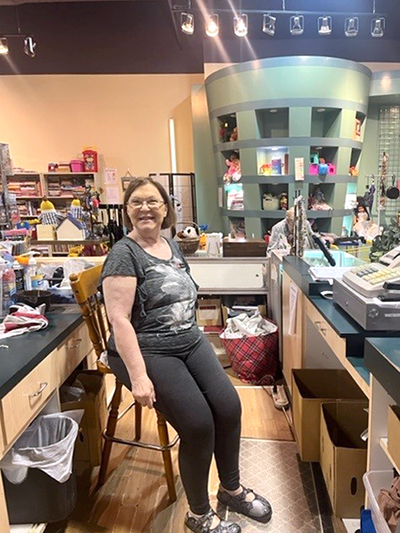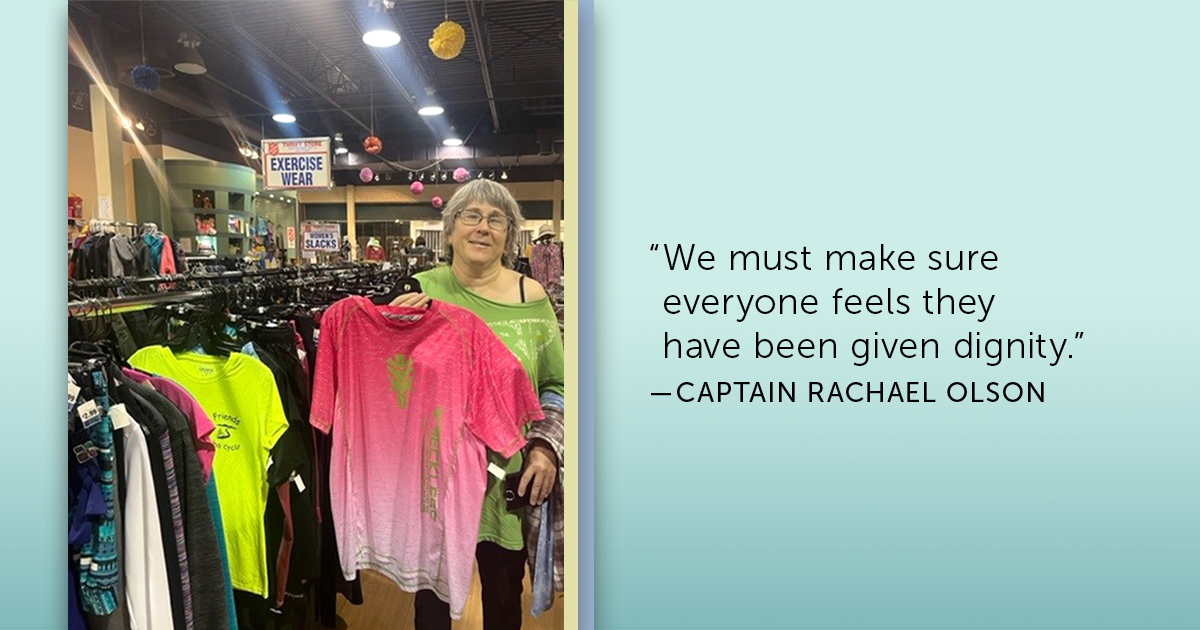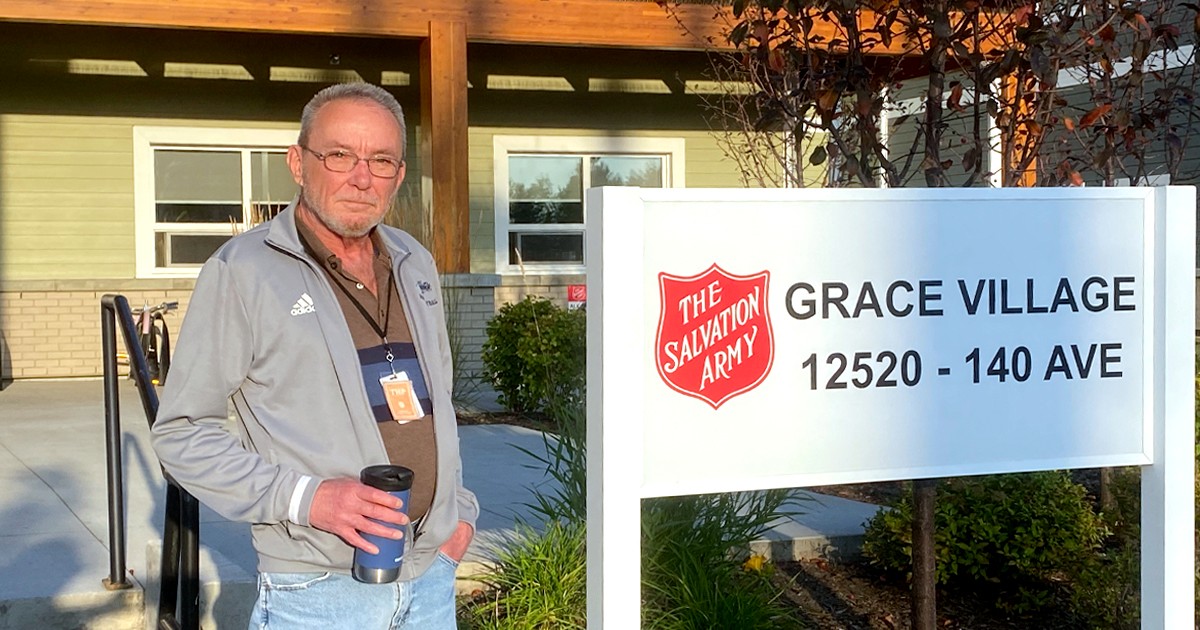At The Salvation Army in Trail, B.C., giving hope means giving people equal access to services and opportunity to participate. With ongoing efforts to make their corps and thrift store building accessible to all, and an employment program that helps provide jobs to people with exceptional needs, Trail Corps ensures that everyone can take part with dignity.
“If people can access our services in dignified ways or find a sense of belonging working within their strengths and capabilities at our thrift store, then we are fulfilling our mission and serving God,” says Captain Rachael Olson, corps officer. The Salvation Army’s commitment to accessibility means that every corps member, customer and community member feels valued and seen.
Small Changes, Big Impact
“We must make sure everyone feels they have been given dignity,” says Captain Olson. “Nobody should have to go through their day and wonder, Can I make it up the stairs? Can I even make it to the washroom?”
In March of this year, Trail Corps installed a new accessible washroom in the church building and will soon renovate the ramp into the sanctuary. The newly renovated building features an accessible elevator, automatic doors to the main entrance with push buttons at both foot and arm level, and accessible seating in the café for every person to enjoy a meal comfortably. Each of these changes creates a space that is available to and inclusive of everyone and demonstrates a Salvation Army that meets all human needs.
“For many years, there hasn’t been an awareness of the needs of those in wheelchairs, with walkers or canes or who may just be unsteady on their feet,” says Captain Olson. She tells the story of one congregant who could only use the washroom on the lower level of the church, but struggled going up and down the stairs. “There was a lack of dignity in that,” she says.
According to Captain Olson, the people in her corps and community are aging, and therei s a growing need to consider accessibility for seniors, those with mobility issues or even people who require different height accommodations. “Most people may not think of it, but when making our accessible washroom, we even had to consider the size and height of the toilets,” explains Captain Olson, who emphasizes that accessible facilities may seem to be a small matter but they preserve the dignity of the people in the corps who need them.
In addition, The Salvation Army thrift store in Trail is set to move into a new location in September, which is currently undergoing a renovation with similar accommodations in mind, including an accessible elevator and a resized sales counter with one lowered side that is easy to reach for individuals of varying heights. “Someone who uses a walker or a wheelchair can approach the register the same as everyone else,” explains Captain Olson.
“We have to be aware that everything is not going to be accessible or at the right height for everyone,” says Captain Olson. “If there is something that we can do to make someone’s life easier, even just an accessible washroom, then that is also serving God and serving people. And that is what we do.”
Strengths at Work
In addition to the physical accommodations made to their buildings, The Salvation Army in Trail helps find opportunities for workers to make a difference and feel included.

In partnership with agencies and organizations in the city such as Career Development Services, the Army can provide work for people who need experience and income, but who may require additional support in the workplace. Some of these agencies work with individuals who have disabilities, receive government disability support or who cannot work regular hours due to personal or medical reasons.
“Our goal is to be fully inclusive,” says Deanna Peters, community ministries director, who works with each partner agency to determine the needs and accommodations required for each individual, and what type of work role would be best suited to their strengths and skills. They are then given opportunities at the thrift store, food bank and in other programs, receiving employment and income. Shift schedules and tasks are flexible, and employees can work independently or with assistance from staff or support workers who accompany them during their shift, providing direction and guidance.
“One volunteer, Sherry, works eight hours a week at our thrift store. When I asked her what she liked most about working there, she said she knows she is always supported, has a set routine and feels appreciated by our employees,” says Peters. Another employee, Christine, works there part-time and has recently won a workplace achievement award for sales. “She takes time to get to know our customers.”
“Everyone is different, and we want to see them use their strengths in their work, and we praise them for it,” says Captain Olson, who explains how these job accommodations allow each person to work within their capabilities. For example, if an employee who comes through the program enjoys sorting or counting, they may work in the food bank sorting canned goods or donations. “They can do manageable tasks on a smaller scale. They gain work experience, learn employment skills such as time management, and at the same time, they can assist The Salvation Army in mission.”
Hope and Dignity
According to Captain Olson, The Salvation Army’s commitment to accessibility is integral to mission. “This is part of our calling as officers and Christians,” she says. “Beyond just preaching, our role is to be in society, to get to know people and their needs, and to help them in any way we can.
“If we can bring a little bit of dignity and hope to our corner of the world, it can make a difference and glorify God,” concludes Captain Olson. “By providing accessible services and opportunities to his creation, we are showing his love.”
This article is the third of a four-part series on accessibility in the church. Articles will be published monthly, alternating in print and online at Salvationist.ca.
Read the rest of the series here:
Acting on Accessibility: New accessibility committee at Winnipeg's Heritage Park Temple helps meet unique human needs.
A Theology of Welcome: St. John's Citadel, N.L., reaches out to the community with accessible programming.
Unity in Access: A new sensory room at St. Thomas Citadel, Ont., is creating a more understanding church.










Leave a Comment